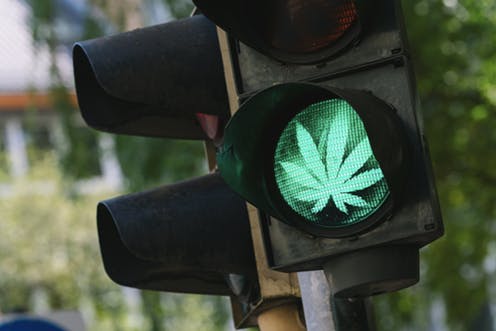INSIGHTS
Legalising Marijuana: Is this Good or Bad for Regional Financial Institutions?


A Firstline Securities Blog by: Ahamad Hosein
When marijuana was legalised, financial institutions in those countries experienced an overwhelming demand for their services. Monies which had once been circulating in the abyss of a world of dark economies were now being cleaned and brought into the light.
Financial institutions have therefore seen an onslaught of applications to fund marijuana projects: from planters and growers, to companies which process, package and distribute usable products.
The new market exhibits such products as:
- Cannabis Oils
- Cannabis Beauty & Skin Care Products
- Cannabis Beverages and Food Products (even butter)
- Cannabis Chocolates, Brownies and Muffins
- Cannabis Gummies
- Cannabis Capsules
- Cannabis Dog Treats
- Cannabis Tampons
- Cannabis Teas & Coffees
- Cannabis Topical Balms
- Cannabis Smoking Devices (including Vapes)
- Cannabis Gear; and much more.
This value chain has seen the emergence of a vast new world, in which markets will require the support of industries such as: agricultural supplies, farming equipment and tools, plastics, bottles, transportation, machinery etc.
Further, heavy capital injections and investments will be needed to ensure safe and profitable products are made. Sales revenues will have to be banked, and salaries (as well as other outflows), will all be required to be distributed via the financial sector.
What does this therefore mean for the financial and banking industry? From all appearances, it seems as though an entirely new sector has been created – (from a small, green plant) – bringing with it a host of opportunities from increased job creation, to greater revenues in taxes, licensing and regulatory fees. It all seems like a ‘win-win’ scenario.
However, we all know that every coin has two sides, and in this particularly unique instance, it’s worthwhile to explore the underbelly ramifications financial institutions in our region are likely to encounter with the legalisation of cannabis.
For a short answer on this, it is safe to infer that Caribbean financial institutions will take their lead from the US…and what exactly are US Financial institutions doing?
US Financial Institutions have obtained protection via the introduction of The Secure and Fair Enforcement (SAFE) Banking Act which was introduced earlier this year in the US House of Representatives:
The SAFE Banking Act prohibits a federal banking regulator from:
- Interfering with the deposit insurance of a financial institution for providing financial services to a state-legal cannabis business;
- Interfering with a financial institution offering financial services to a state-legal cannabis business;
- Interfering with a financial institution offering financial services to an individual because of his or her affiliation with a state-legal cannabis business; or
- Taking any improper supervisory action on a loan to an individual because the person owns a state-legal cannabis business or owns real estate or equipment leased or sold to such a business.
It should be noted The SAFE Banking Act does not make cannabis legal. Cannabis (now defined to exclude hemp) would remain a Schedule 1 drug under the Controlled Substance Act. The SAFE Banking Act does not protect businesses that provide services other than insurance or financial services.
In the past three years, according to various sources, marijuana-related businesses have taken Wall Street by storm. Even with cannabis stocks in a current market funk, the biggest names in the industry such as Horizons Marijuana Life Sciences ETF, Innovative Industrial Properties and Valens GroWorks to name a few, are many multiples higher than they were three years ago, on the expectation that legal weed sales will grow somewhere between 5 and 18 times the $10.9 billion in worldwide sales recorded in 2018, by the end of the next decade.
Despite being a lucrative industry to Countries and U.S States, the cannabis industry around the world will be affected as the U.S. federal government has remained firm on its classification of marijuana as a Schedule I substance. This classification means marijuana is in the same boat as heroin and LSD as being illegal.
Closer to home, The Barbadian Nation Newspaper reported on November 28, 2019 that, “Banks and credit unions may not accept ganja money. Government’s proposed medicinal cannabis industry is facing a big stumbling block.
Commercial banks have signalled they are unlikely to accept any money associated with the sector’s various activities, warning that doing so would jeopardise their correspondent banking relationships overseas.
As it now stands, credit unions, which are customers of the banks, have to comply with various anti-money laundering/countering financing of terrorism (AML/CFT) requirements and would therefore have to say no to the new sector.”
Dr. Christopher Malcolm, Former Attorney General of the British Virgin Islands and Head, Legal Unit of the Organisation of Eastern Caribbean States, was a guest speaker at the Association of Compliance Professionals of Trinidad and Tobago (ACPTT) event and echoed that local banks risk losing correspondent banking relationships with their overseas counterparties if they provide financial and banking services to this new sector.
We in Trinidad and Tobago are in the process of decriminalising marijuana as soon as President Paula-Mae Weekes signs and proclaims The Dangerous Drugs (Amendment) Bill, 2019, and if successful, naturally it will give rise to new industries and businesses. Not only will a new industrial sector be created, this industry will contribute to the GDP and garner all the many positive side effects as a result of legalising marijuana such as tax revenues, increase income and jobs, investment opportunities and reduced associated expenditure in law enforcement.
However, financial institutions will more than likely opt to ‘wait and see’ before jumping in to service this new sector. Financial institutions face stringent legislation and regulations, not only from within but also from overseas counterparties. Failing to satisfy any legislation or regulations set upon financial institutions by local, regional or international regulators would result in financial institutions being penalised, fined or blacklisted.
As Trinidad & Tobago joins other Caribbean islands set to decriminalise marijuana, we should take precautionary steps to protect our financial sectors.
Some examples of the precautionary steps are to:
- Conduct a Due Diligence on your counter party and research their legislations and best practices.
- Verify with the appropriate authorities whether the business is duly licensed and registered.
- Review the license application (as it can be a document the correspondent bank might be willing to accept)
- Request available information about the business and related parties from licensing and enforcement authorities
- Develop an understanding of the normal and expected activity for the business, including the types of products to be sold and the type of customers to be served (e.g., medical versus recreational customers) full KYC
- Monitor publicly available sources for adverse information about the business and related parties on an ongoing basis
- Monitor suspicious activity on an ongoing basis
- Update information obtained as part of customer due diligence on a periodic basis and commensurate with the risk
In conclusion, it’s my view that until the US Federal Law changes and local financial and bank sectors are confident of not losing their correspondent banking relationships, investors shouldn’t expect to see many securities being issued for marijuana-based product manufacturing as the marijuana industry will not have the luxury of financial facilities and services until international counter-party regulations and legislations change.

